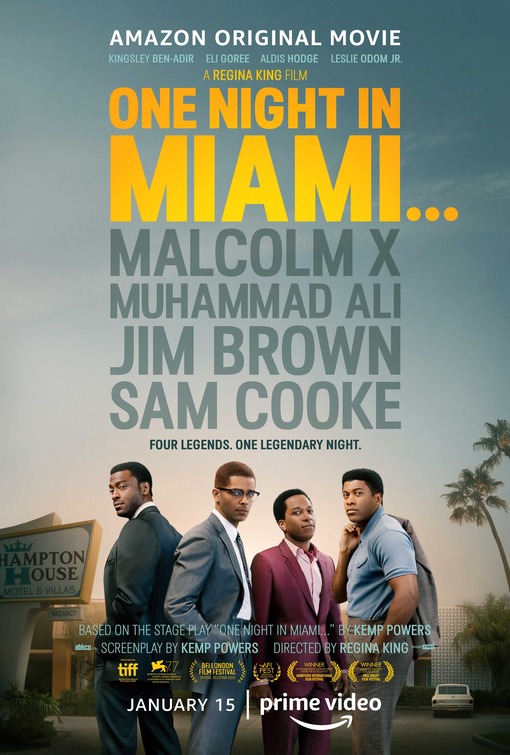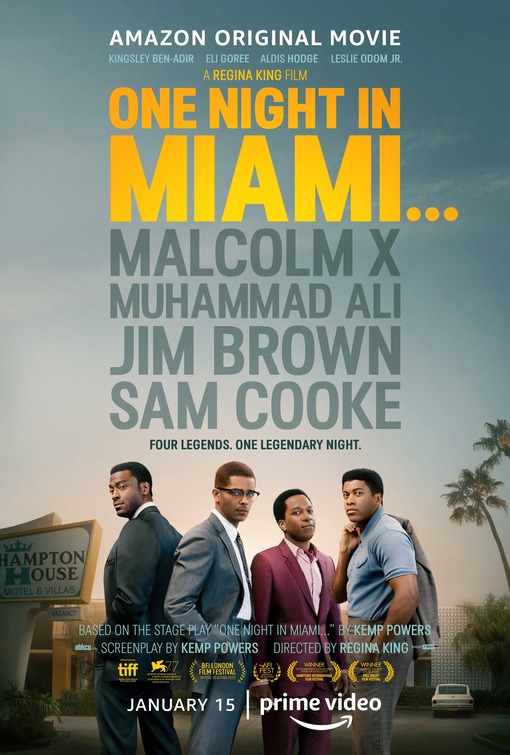
So let me set the stage. Muhammad Ali (Eli Goree) has just pulled off one of the greatest upsets in sporting history by beating Sonny Liston (Aaron D. Alexander). Civil rights activist Malcolm X (Kingsley Ben-Adir), singer Sam Cooke (Leslie Odom Jr. ), and NFL player Jim Brown (Aldis Hodge) were all ringside to witness it. Afterward, these four American icons decided to hang out. The date is February 25, 1964, and their meeting really happened. This movie, however, is a fictionalized version of what they might have talked about. It is an compelling idea for a film. This was a pivotal moment of contemplation in the career of each of these 4 young men. The magnitude of their encounter is underscored by the fact that Malcolm X and Sam Cooke would both be murdered within a year.
One Night in Miami is the directorial debut from Academy Award winning actress Regina King (Jerry Maguire, If Beale Street Could Talk) based on the play written by Kemp Powers. The plot merely revolves around a conversation. The play leans heavily on the repartee between its four principal players. You’d expect them to agree but their differing ideologies are a big part of the conflict. Malcolm X and Muhammad Ali seize focus as the principals. They control and guide the deliberation. They are more aligned in political spirit whereas Jim Brown and Sam Cooke’s views are a little divergent. Yet they all share a mutual respect for one another. The Civil Rights movement was ongoing concern. As they speak we come to know what’s going on in their lives and how they wish to proceed in their separate careers.
One Night in Miami concerns four inspirational icons that spar over weighty matters. The screenplay is shrewd enough to present each of these individual men not as legends but as human beings with vulnerabilities. Of all the depictions, Leslie Odom, Jr stands out as Sam Cooke. He disappears into the role so you feel you are watching the soul crooner himself, not an actorly achievement. Odom’s extensive theater experience (Rent, Leap of Faith, Hamilton) also means he can do his own singing and that is just as impressive as the performance. The best interactions involve him and Malcolm X. My favorite part is when Malcolm X reminisces about attending the singer’s concert and how Cooke won over the crowd when his microphone didn’t work. That little vignette was so captivating I started to wonder what a Sam Cooke memoir would look like. His life would undoubtedly make a fascinating movie. This is not a traditional cradle to the grave biography. This is merely a snapshot in the lives of these men. I do appreciate that approach. It is unique.
Where the picture falls short is in the authentic presentation of a leisurely exchange. The dialogue here doesn’t sound natural. It’s infused with the well-researched viewpoints of a writer. You never forget this is a play. What might these historical figures have talked about? Apparently the preferred subject is politics. It’s focused on a philosophical debate that deals with the plight of African Americans and what the moral obligation of black men in positions of power and cultural influence should be. There is a lot of self-reflection. No resolution per se. Just conversational gymnastics. Most of the so-called action takes place in Malcolm’s room at the Hampton House motel. This isn’t a production rooted in a strong narrative structure. To that extent, the tale doesn’t rise above its stage origins. That has been a difficult task as of late. The recent Ma Rainey’s Black Bottom also had that issue. Nevertheless, it’s an interesting and timely effort. This is sure to be a future favorite of high school history teachers on the American civil rights movement. As an intellectual exercise, the work is intriguing. As a piece of entertainment, it’s a bit less engaging.
12-29-20


3 Responses
I liked this (didn’t feel like writing about it immediately though) and Ma Rainey a bit more than you did, but, it does feel like movies adapted from works intended for and originally launched on stage have a ceiling no higher than “good” simply due to the stiff at times dialogue and static settings.
Actually my #1 movie of 2020 was literally the filmed performance of stage play so these works can definitely rise about their stage origins.
I stand corrected!